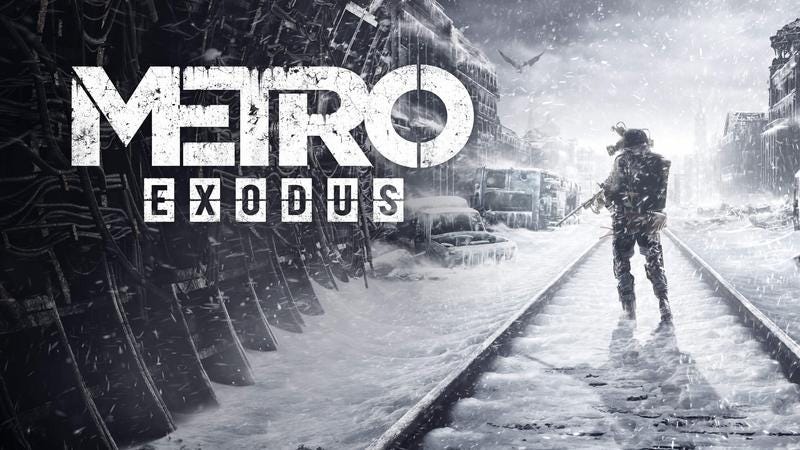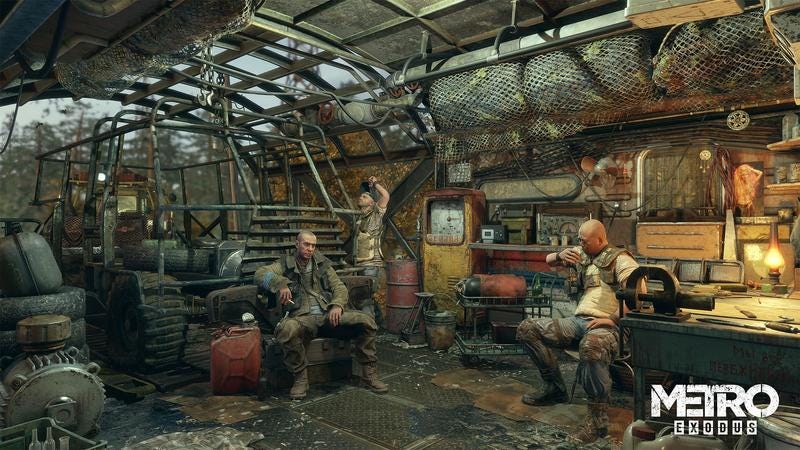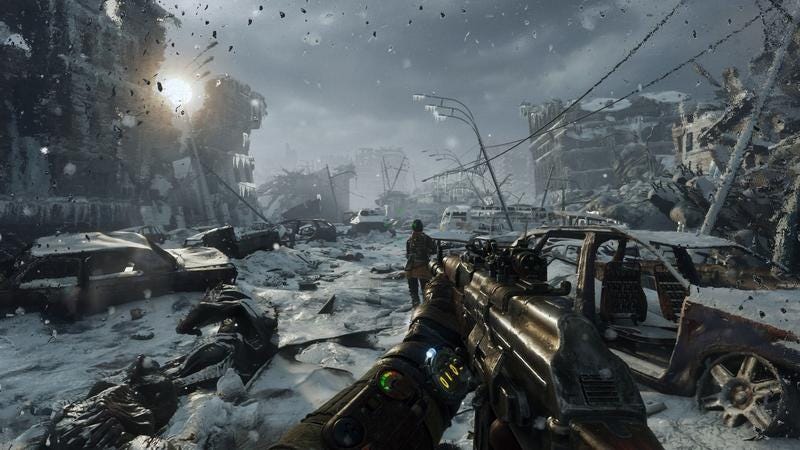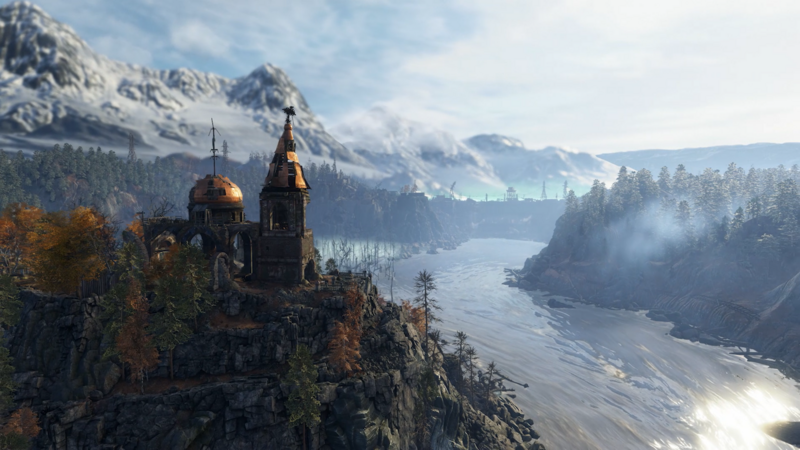Ben Plays: Metro Exodus
Not exactly the bullet train
There's something extraordinarily weighty, cumbersome even, about first person shooter, Metro: Exodus. Everything about it feels laboured: the heavy rasping breaths your character, Artyom, draws from the irradiated, wispy air; his sluggish movement through snow, sand and spiderwebs; the innumerable, protracted and one-sided conversations he has with every character he encounters, no matter how minor, each determined to tell their story as slowly as possible while Artyom drags on a cigarette, chugs brown liquid from a mug, or simply looks around, twitchy with impatience for them to crack on and finish talking already. By the time the credits rolled, 40 hours after setting out into the game’s nuclear winter, I was exhausted, and not in a good, thoroughly spent, post-coitus way, but more in a drained, post-illness, “is it really over now?” sort of way.
There’s no gradual assimilation into Metro: Exodus’ taut, claustrophobic atmosphere, you’re thrown straight in, zippo and gun at the ready. Immediately after the game starts you nearly lose your limbs to feral mutants, recover in a gnarly sick bay, then get slapped about a bit by boisterous comrades happy to be reunited. After this brief establishing stint in the eponymous Metro, fending off dusty cobwebs and not so much exchanging as enduring the garrulous banter of other soldiers at your base camp, the story jumps forward a little, and picks up as Artyom and his wife Anna, who is also his commander's daughter, are scouting the surface. They spot a train and pursue it, embroiling themselves in an encounter which sees Artyom left for dead and the first elements of stealth gameplay introduced. A short while later, you steal your own train, the Aurora, regroup with your motley crew - The Order - and you're set to explore the great outdoors. It's revealed that Russia is still at war and Moscow chose radio silence to 'play dead' in order to avoid further nuclear attacks. Minds blown by this knowledge, your squad resolves to fight through the occupation armies and reach a government stronghold where they might find more substantive answers. Aaaand, it more or less all goes to shit from there.
From the starting area of Volga to the concluding ruins of the Dead City, Metro: Exodus steers you through a deceptively linear nuclear wasteland of forest, desert, swamp, tundra and, of course, subterranean tunnels. Some sections might technically fit into a generous interpretation of ‘open world’ but it’s a pretty closed ‘open world’. Each of the four zones is small, with limitations built into the environment (cliffs, water, walls, dense vegetation, and Artyom's inability to climb anything that isn't very evidently path-like), and once you're in a building complex or choreographed action set piece, things revert to being ‘on a rail’ linear. This isn’t a criticism. Frankly, it proves a sensible design choice. The wasteland is fraught with danger and time consuming enough to explore as is, if it were any more sprawling it’d be a mess. It’s broad enough to feel like an adventure and narrow enough to retain its focus.
The story unfolds in a manner similar to Call of Duty and other blockbuster titles, playable set pieces intercut with long cinematic sequences that relegate you to spectator rather than player. It can be visually impressive, but the cut scenes are so frequent as to be jarring and push you out of the action rather than drawing you in. The addition of ‘quick time’ interactivity does nothing to compensate for that disconnect and, in fact, rubs some salt in the wound, since you have to be alert for input rather than relaxing into the narrative. These sequences are also used to begin and close an act, disguising transitions into each distinct area in the game and they often conclude with a deus ex machina saving Artyom from certain doom (in one instance, the arrival of a bear saves him from a man trap, in another, a ‘missing’ character returns in the knick of time). These usually form the prompt for the next mission, too: someone is captured and needs rescuing, you’re separated from your camp and must find your way back, someone is injured and requires medical supplies. It’s not subtle, but it works, and you spend so much time with the characters, you’re certainly motivated to help them survive.
Story development also happens through conversation. Given Artyom is a wordless protagonist, Metro: Exodus is extremely dialogue heavy, even outside of cutscenes. If you play with subtitles on (as I always do), then you find yourself reading a Dostoevsky amount of text while navigating the wasteland. Everyone and their dog has something to say. Even the dead are leaving behind voice notes and diary entries, and your comrades exhort you to chew the fat with them at every opportunity, something the game singularly fails to weave seamlessly into its gameplay: “Artyom! Pull up a chair! Take a seat! Have a drink! Want a smoke?” These are often during interludes on the train between missions and new areas, moments the game treats kind of like an intermission, reminiscent of camping in Red Dead Redemption 2. But that game offered a level of immersion Metro doesn’t come close to. Milling about awkwardly while wooden animations witter your ear off is worse than a passive experience. Games that have done this successfully in the past offer engaging insights, and always provide an interactive and curious environment to enjoy while listening (I remember gleefully teleporting a plant back and forth as I listened to Eli Vance in a lab in Half-Life 2). The equivalent here is sipping dolefully from a tin mug while sitting rigidly in a chair. On the Aurora, even playing a guitar duet is somehow turned into a bore.
This being said, I was thrilled that developer 4A Games bothered to translate this huge volume into a multitude of languages - something I’d love to see more studios do. I went with the default stilted English for a while, then hopped to Russian for a bit more of a native experience, before settling on telenovela style Spanish in a guilt-induced effort to practice. When you’re spending tens of hours in a game, it can be a good way to help learn. (Or at least, that’s what I tell myself!)
Anything of import you fail to learn from in-game dialogue is explained to you via loading screen exposition - little summary paragraphs that fill in all the key plot points. This is a detail that's actually quite useful, particularly if returning to the game after a long period away. There are also collectibles such as postcards, notes and recordings that pad backstory and contribute to the overall sense of world building. These discoveries are fairly comprehensive (other than the postcards), and mostly feel like they add value, which is a relief, because as much as it pretends like it wants to be, Metro: Exodus is not generally a game that rewards exploration. You can wander way off the beaten path, scour the rusted hulk of a ship, destroy mutant nest after nest of mutants, and still only unearth a few measly provisions to restock your ammunition. Even bothering to recover a mangled teddy from beneath the claws of a flying demon does little more than cheer up the little girl you return it to. Don’t get me wrong, I’m glad she’s happy, but some sort of material reward wouldn’t go amiss - that was a ton of effort!
Enemies come in all shapes and sizes, but never feel particularly original: violent critters include mutated fish, wolves, bears and gorillas (!!), while trigger happy humanoids are a mixed bag of megalomaniacs, cannibals, religious zealots and run of the mill bandits. They all act much the same though, and your approach to dealing with them is unlikely to vary: avoid their headlamps and torches, sneak up and stealthily dispatch them from behind.
Though ammo is generally scarce, there’s a fair amount ahead of key fight scenes, and in any case, the ability to quick save and quick load leaves you comfortably able to save scum at will (should you so choose). Once you’ve made some headway through the game and accrued a few upgrades, your scrap metal custom build air rifle, the Tikhar, deals plenty of damage and is cheap to craft bullets for on the fly too. There’s a selection of other customisable weapons, rifles, revolvers, shotguns, but the game is constantly discouraging you from using them. Either you don’t want to break stealth, or you’re trying to avoid bloodshed at the behest of some character, or you’re simply low on ammo. I didn’t mind this in terms of gameplay, preferring to sneak around anyway, but I am frequently baffled when games give you a hoard of weapons to choose from, then only let you carry a couple of them, and even then, with caveats. Sure, there are some cool attachments, suppressors, extra barrels, scopes, but they each come with a trade off that is mostly too big to swallow. Take the quadruple barrel Ashot (a pistol that fires shotgun shells - you figure it out). Assuming you hit, it packs a serious punch, basically a one shot kill, but it fires four shells at once! I can only carry 48 with an upgraded ammo pouch, much less if I’ve decided to use the extended throwables armour instead, or the extra consumables carrier. Similarly with bracer attachments - a movement sensor seems useful, but when you’re surrounded with enemies (and non-enemies), the endless bleeping is like Japanese water torture, and wouldn’t a metal detector be more useful? It would be, if I’d ever discovered it. In a locked shack in the first area I’m told. All those hours of unrewarded exploration and I still didn’t find the damn upgrade. I ended up sticking with a basic compass. You can’t go wrong with good directions, eh?
In any case, all these customisations and trade offs feel plenty gritty. The whole game feels gritty. I think I’ve still got some sand in my teeth now. Your uncleaned weapon might jam from dirt. Mud splashes on your visor, which you'll need to wipe every so often to retain visibility. The face mask will crack and get blood stained when you take damage. You'll also need to frequently replace your air filter when out and about in the wilderness - a bit of a nuisance but a fair game mechanic given your radioactive surroundings. In fact, since the story line forces air quality to be a key factor, the game leans into it. Straying through pockets of dense fallout will send your Geiger counter into a percussive frenzy of clicks, trigger Artyom’s early lung cancer, and occasionally disable your electronics (torch and night vision goggles). If suitably stocked up on filters and med kits, it’s nothing insurmountable, if not, you’ll find yourself panicking in the dark, clutching at your feeble, flickering lighter with scavengers scurrying in the shadows, waiting for you to succumb to the poisonous air. Later in the game there are extended sections where radiation will cause your vision to be littered with green dotted artifacts, heavy vignetting and, ultimately, hallucinations.
Graphically, at least, Metro: Exodus is no slouch. There's a level of detail in the face models, environments and textures that comfortably betters most other games, to a degree that I was prompted to consider the increasing importance of display size and quality when playing modern titles of this visual calibre. The lighting, shadows and reflections, sunrise to sunset, are crisp and realistic, and deserving of a decent graphics card and high-res screen. The environments are beautiful and invite exploration. They really deliver pure wonder at times. I love video games for this. To be given a sense of the sublime while sitting in your house is an astonishing feat of creativity. It’s a shame the enemy art design isn’t equally inspired. None of the creatures are all that fearsome, and given so many of them attack or congregate in a pack (or community), the lack of variety in their appearance is particularly noticeable. Similarly there is room for more knock-out and assassinate animations. There are only so many times you can creep up behind someone and tap them lightly on the head before the incredible consistency of the maneuver grows stark. So, too, with villain small talk; odd that every bandit in a camp utters the same phrase.
Sour as all this may seem, by the time I'd left the initial area of Volga, the game had won me over. I was excited to boot it up and play, and was getting up earlier to allow extra time to explore. It was satisfying to clear out a bandit encampment without triggering the alarm, and even more satisfying to achieve the objective in an enemy stronghold without having to engage anyone at all. One good example of this thrill is an early mission that sees Artyom silently sneaking onto a boat to smuggle his way onto a heavily fortified bridge. I crawled through open windows, puffed out candles to hide in shadow, and in one memorable moment, leapt onto a dangling lifeboat, using its swaying in the wind to swing around an obstacle into the next area. It was an edge of the seat moment and the most fun I had in the entire game. The issue is that Metro: Exodus doesn’t know when to stop. It’s not enough to fight the bear once, he has to return over and over. It’s not enough to kill a gorilla, you need to be faced with two or three. It’s not enough to be given a two minute mission briefing, you need a ten minute one, then a chat with every member of the crew, and then a trip to the workbench to clean your weapons and craft more ammo. It’s epic in the way Russians always seem to do epic, which is to say, too bloody long!
This was my third attempt to play the Metro series and second attempt to play this particular game, the first being on a PS4 Pro where it performed so badly, even after reinstallation and multiple massive patches, that I gave up. Despite my extensive criticisms, I’m glad I tried again on PC and stuck it out this time. Though it doesn’t entirely succeed, it’s admirable in its ambition, and provides hours (no, really, tens of hours) of bang for your buck. Metro: Exodus is the third entry in the franchise, excepting Metro: Redux which was a remaster of the first two games and their DLC, but it won’t be the last. A follow up has been confirmed by Metro author, Dmitry Glukhovsky. Based on this, I think I would play that one too, but let's hope next time they strip the bloat and streamline the whole experience.




